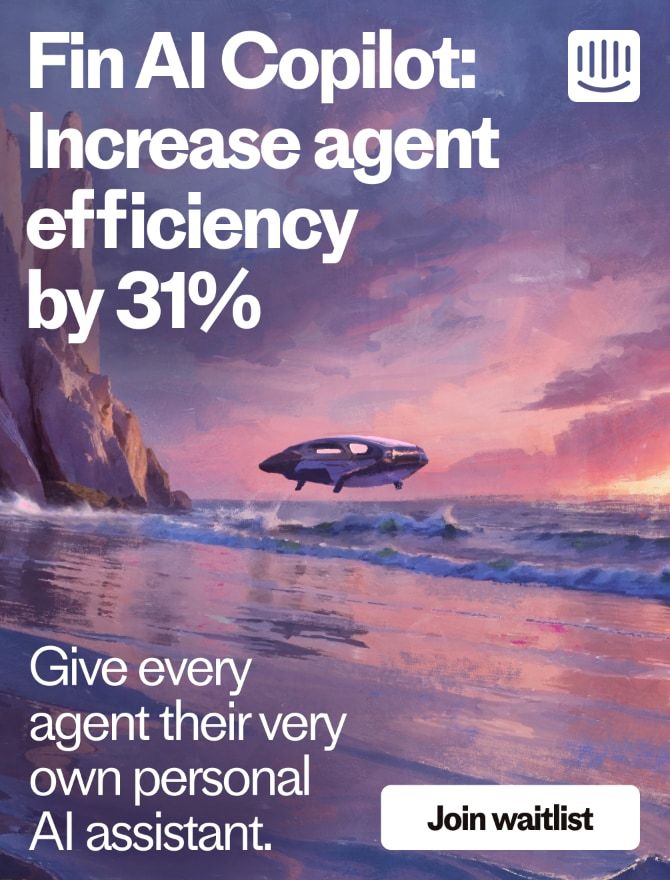
Storytelling is great, but is it enough?
Main illustration: Tess Smith-Roberts
The notion of storytelling has pervaded the marketing world as of late.
Companies work to unlock the story of their brand, to tell the story of their target customers, use data to tell stories about their industry or provide further insights. The word has popped up in job descriptions: rather than writers and editors, companies hunt for storytellers who can bring their content to life (Microsoft even has a chief storyteller). Meanwhile, CEOs are increasingly seen as leading their companies by the stories they tell.
This trend gets at a central truth: we like hearing stories. They engage our imagination, they inspire us, they reveal morals and promote values. So it’s no surprise that storytelling has become such a popular part of brand marketing. Here at Intercom, we love to tell the story of how our founders brewed up the idea for Intercom over a steaming cup at a 3FE coffee shop in Dublin.
And yet, all this emphasis on storytelling glosses over the quality that’s even more crucial for a brand’s content marketing to find success: personality.
A focus on storytelling risks overshadowing the quality that leads to a sense of connection between brand and audience – stories, and content in general, need to convey personality to resonate. People are drawn in by stories, but after the plot twists and narrative turns have faded from memory, it’s the personality that lingers.
Personality is what forges connection
Storytelling itself is simple: characters, fictional or real, encounter a problem, struggle to overcome the challenge, and grow in some meaningful way along the journey. But the personality behind the story goes a level deeper. It’s the warm glow within the overarching narrative bulb. It’s the personality of the brand, of the author, and of the actual people or fictional characters within the story that makes it memorable. That’s what makes a story resonate.
Just like an author can be an excellent storyteller, a master of narrative structure, the great authors of our time are more than just great storytellers. The great authors create a connection to readers through the atmosphere and personality that they’re able to build and weave. One that we, as readers, feel attached to as an extension of our own present.
“Not every piece of content will fit into a classic narrative shape, nor should it”
Differentiating storytelling and personality in content is key for a few reasons.
First, not every piece of content will fit into a classic narrative shape, nor should it. Thinking every piece of content needs to be a story does it a disservice and ignores the structure the topic needs to be successful. For example, a definitional post on in-app messaging will take a different approach than a post that seeks to impart an opinion or a new insight on the way in-app messaging should be done. Storytelling would work well in the second post, but feel out of place in the first. Personality, on the other hand, should find a home in both.
Second, content that purely tells a story with a beginning, middle, and end versus a story that builds atmosphere misses the opportunity to build a connection with your audience. A focus on plot can lead to neutral content that fails to move or engage the reader.
One of my favorite examples of this is JRR Tolkien’s The Lord of the Rings. The story, an epic tale of a quest to destroy evil and restore balance, is fascinating and riveting. But the true mastery of that series is in the portrayal of Middle Earth, a world so well depicted it feels real, and in the personalities behind each unlikely (and likely) hero. It’s not the plot that makes The Lord of the Rings so great, but the vivid personality that Tolkien manages to bring to his characters and world.
“It’s those stories that are chock full of evocative details that build a stronger relationship with prospective customers”
To narrow the lens and apply this idea to content marketing, we can think about it in terms of customer stories. Some companies opt to share a brief synopsis of a customer’s challenges and results. Others carefully build a connection between the reader and customer through dialogue and experiences, where the reader can glean a better and more meaningful understanding of how the customer benefitted from a product or service.
While the short version might do the trick, it’s those stories that are chock full of evocative details that build a stronger relationship with prospective customers.
“The personality of your brand needs to permeate every piece of content”
In short, storytelling is over-emphasized in the marketing world. A brand can be excellent at telling stories, but if those stories don’t have a unique personality, perspective, or voice behind them, they won’t resonate with any audience. They won’t be memorable.
The era of empathy
When we apply this to content marketing, the personality of your brand needs to permeate every piece of content. That’s how you’ll create a lasting connection with your customers, one where they feel like they not only have a relationship with your product, but with your brand, too.
The idea is that by using empathy, strong opinions, an established tone, and real, relatable experiences and advice, your content will ignite something that goes beyond a business/customer relationship.
Think about your favorite brands and how their content actually makes you feel – do you think of the narrative of their brand story, or do you think of the personality of the brand?
Any brand can add that spark of personality to their content. Most don’t.
Embrace your brand’s voice
So, throw out neutrality in your content. Don’t just tell the story, bring it to life through your brand’s personality, mission, and through the many people who make up your company, and the many who make up your customers. Embrace the fact that your audience is going to imbue what they read as a reflection of your personality.
Tell the story and bring your brand’s characters to life – just like the great authors would.






